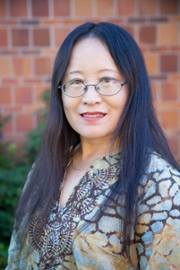
USask Engineering researcher awarded Canada Research Chair
Xiaodong Liang is the new Canada Research Chair in Technology Solutions for Energy Security in Remote, North and Indigenous Communities
By USask Research Profile and ImpactSASKATOON - Three University of Saskatchewan female researchers recognized as among Canada’s most promising leaders in their fields have been awarded new Canada Research Chairs (CRC) to advance their innovative work in digital gaming, northern energy security, and health history.
Computer science professor Regan Mandryk and history professor Erika Dyck have been awarded Tier 1 chairs that each provide $200,000 annually for seven years. The Tier 2 chair of Xiaodong Liang, associate professor of electrical and computer engineering, provides $120,000 annually for five years.
As well, USask geological sciences professor Ingrid Pickering’s Tier 1 chair in molecular environmental science has been renewed for seven years. Pickering uses the Canadian Light Source synchrotron, a national research facility of USask.
“Federal investment in these prestigious research programs recognizes the outstanding contributions of these female researchers to research excellence in Canada and our commitment to building an equitable and diverse research community,” said USask Vice-President Research Karen Chad.
“These innovative research leaders will help develop solutions for challenges facing the world today and help attract promising young researchers.”
The four USask awards totalling $4.8 million were part of a national CRC announcement today by Innovation, Science and Industry Minister Navdeep Bains.
Developing technology solutions for energy security in remote communities

Xiaodong Liang’s CRC in Technology Solutions for Energy Security in Remote, North and Indigenous Communities is the first of its kind in Canada. The research program is aimed at developing a new system of isolated microgrids, powered by renewable energy such as wind and solar.
About 200,000 Canadians in 280 remote communities, along with many others in northern global areas, rely on off-grid power for electricity and heating, produced primarily by diesel generation. This is costly and fraught with environmental impacts such as greenhouse gases and diesel spills.
With built-in energy storage capacity, and advanced monitoring, control and protection techniques, these microgrids will improve reliability and resiliency of power supply in remote communities.
Liang’s research program includes: establishing methods for remotely monitoring the operation of microgrids and detecting problems; enabling the system to self-repair when a fault occurs; and integrating advanced control techniques to manage power and regulate voltage and electrical flow in response to abrupt surges of power or sudden drops in load demand.
Northern Saskatchewan’s Peter Ballantyne Cree Nation and Gwich’in Tribal Council communities in the Northwest Territories are among communities Liang wants to engage in her research.
CFI has also awarded Liang more than $113,000 to support the purchase of new equipment to test, measure, detect faults, and conduct real-time simulations of the energy system.
Improving well-being through gaming
Through her chair in Digital Gaming Technologies, Regan Mandryk aims to understand and model the complex relationship between digital gaming and its impact on players, with the goal of designing new games and novel interfaces to improve social, emotional, and cognitive well-being.
“While gaming has many benefits, it also can lead to problems,” she said. “So, what is it about the game, the gamer, and gaming context that leads to positives outcomes such as healthy social interactions and stress relief, versus causing harm from problematic habits that affects other parts of their lives?”
Using her research findings, Mandryk aims to design new games that harness the positive sides of gaming enjoyed by many of the 23 million players in Canada, and keep out of harm’s way those for whom the pastime can pose problems.
Mandryk’s research is also supported by $155,000 from the Canada Foundation for Innovation (CFI)’s John R. Evans Leadership Fund to build an esports observation facility and a social game play laboratory.
Providing historical context to health-care issues
Erika Dyck’s CRC in History of Health and Social Justice will contribute to an important historical context for contemporary challenges facing patients, families, service providers and policy makers. She is particularly interested in the complexities these groups face when balancing ethical decisions involving the scientific study of human bodies and providing compassionate care in a public health system.
“I look at the history of medical experimentation, drug regulation, and reproductive health and medicine, including the abortion debate, to show how health care access forms part of the discourse on human rights and inequalities in modern society,” said Dyck, the first USask female academic to be awarded a Tier 1 chair by the Social Sciences and Humanities Research Council (SSHRC).
The overarching vision of Dyck’s research is to examine how Canadians have come to appreciate health care as a basic right, and what that means in terms of how they evaluate health science and interact with health care. “I want to provide some perspective on the way that the public consumes scientific information,” she said.
Additionally, Dyck’s research has been awarded more than $25,000 by the CFI to purchase new, state-of-the art equipment, including virtual reality tools.
Shining a bright light on heavy elements for environmental, human health
Ingrid Pickering develops synchrotron-based techniques to study the roles of heavier elements in biological systems at the molecular level in the environment and human health.
With her renewed CRC in Molecular Environmental Science, Pickering aims to further her research into how the elements selenium, mercury and arsenic, as well as others such as copper, iron and zinc, can have beneficial, benign or toxic biological impacts depending on their chemical form.
She said synchrotron research brings together colleagues from many different disciplines to collaboratively advance USask’s signature areas of research including synchrotron sciences, one health, water security, and food security, with widespread impacts of importance to Canada.

